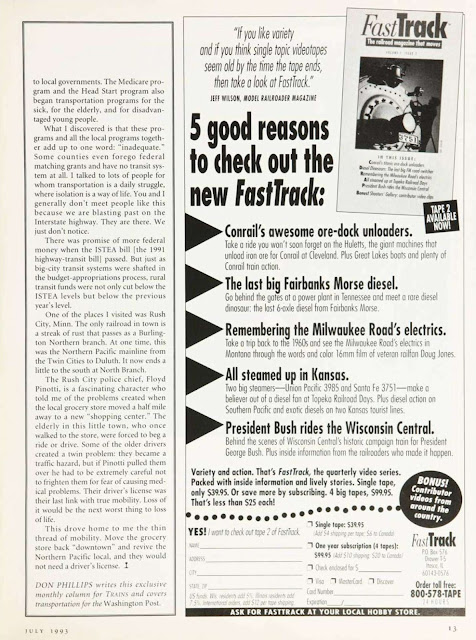 |
| Pagosa Springs in October is pretty, but can you live there? // Milan Suvajac |
There, in July's issue, sandwiched between an ad for Erie Lackawanna VHS cassettes and an ad for FastTrack, a video magazine subscription that predated vlogging by a mere 20 years, was a column that could have been written yesterday. Don Phillips, for all his east coast swagger, nailed down a plight. This plight is both near to my heart and yet so far from a possible solution that will likely never see a resolution to my satisfaction. It is the plight of everyone who lives in Colorado's rural counties and towns.
"What?" say the rural denizens of Colorado. "We're okay." Yeah? Hand me your drivers license. Still ok? No, and why not? Because your four wheels (or sometimes two) are your ticket to American freedom. If you handed over your precious Colorado drivers licenses, you would be cut off from work, from home, from your leisure activities and your grocery store, pharmacy and your doctor when you are sick. Any trip in America and especially Colorado nearly always begins with the private vehicles we own.
We own vehicles? Not all of us. But let's consider: Cars are the required luxury. The essential option. The one thing everyone is free to decline at the peril of losing everything. If you have made it past 60, you know that your insurance premiums are rising and will rise until you eventually cannot afford them or you voluntarily surrender your life on four wheels. You either die before you reach that age or you must surrender your freedom. Oh, that will never happen to you.
Others have never driven a car, but most of us don't know them, couldn't relate to them, or actually ignore them. These are the people who know bus schedules, rely on programs and family members to care enough to meet their transportation needs. But try living near Springfield, Craig, Sterling, or Cortez without a license to
As we found out in 2020, being stuck at home is no fun. Telecommuting, even if you have great internet service, has its limitations. Even the American workplace, for good or for ill, is beginning to require attendance from their employees again. In fact, it's hardly a secret that most of rural America has been languishing since the 1950s. Even in periods of massive growth, such as the teens, multiple Colorado counties have experienced double-digit loss percentages. Why? I'm not sure, but I have a feeling that losing the local train has something to do with it.
The local train? Local train, as in not intercity, not hub-and-spoke, not long-distance. I won't re-say what Mr. Phillips skillfully wrote nearly 30 years ago now, but let me say that I sincerely believe he is right in this case. Please click or tap to view the article.
So, what do we do? Do we just click our tongues and click our mouses (or swipe or scroll) on to the next story? Or do we start thinking about the idea of making things local again? Do we make a point of shopping locally if we can. Heck, what about just trying to remember our neighbors' faces and names? What about remembering the checkout person at the store, or the cleaning person emptying the trash for us? Connecting locally can change everything, especially our living patterns.
I don't have an easy, ready-made solution in the offing for the small town shrink-down, but it all starts with a mindset. Just because it isn't "our problem" doesn't mean it's not worth our time and effort to fix. It needs our attention before the price of groceries goes any higher. Or did you think these problems weren't linked to yours? ⚒
* The collection is now obsolete, superseded by a deluxe subscription to the magazine, which allows online access to the entire back catalog of the magazine including the last 12+ years.



